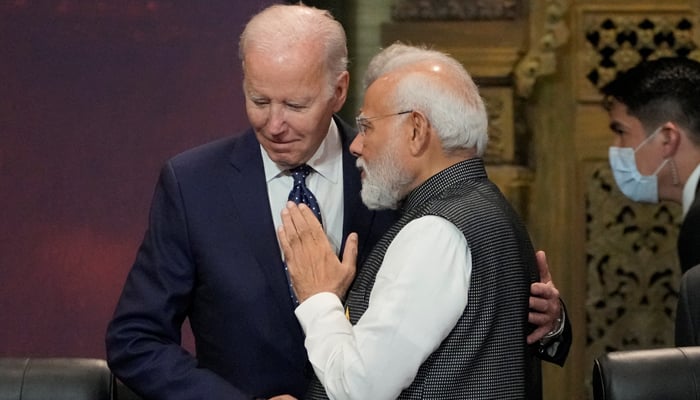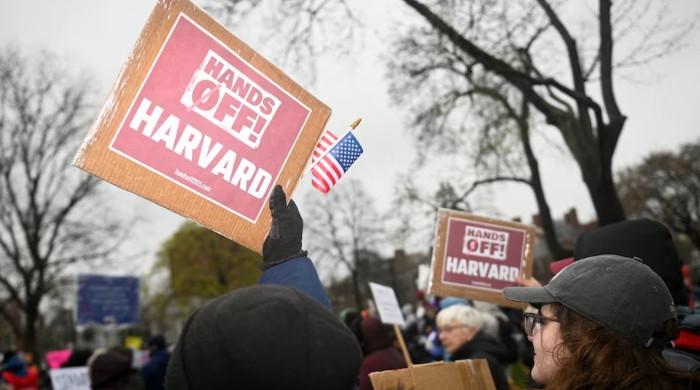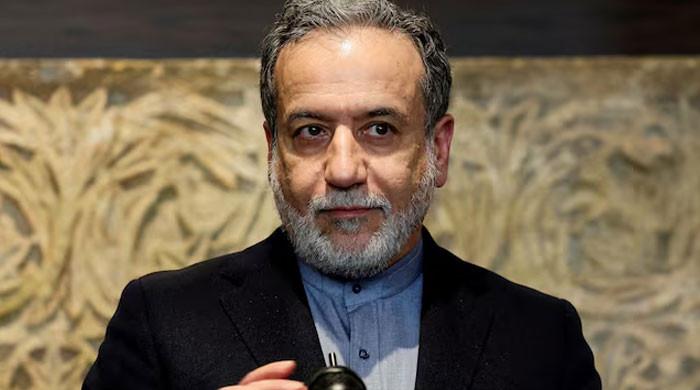India-US relations at risk over Pannun murder plot: Congress members
Lawmakers get classified briefing on Indian intelligence agent Gupta's indictment
December 16, 2023

- Lawmakers get briefing on Indian intelligence agent Gupta's indictment.
- Agent was allegedly involved in plot to kill SFJ leader Singh Pannun.
- Congressmen concerned over potential harm to US-India partnership.
LONDON/WASHINGTON: Indian-American members of the US Congress praised the Biden administration for the classified briefing on Indian intelligence agent Nikhil Gupta's indictment and a foiled murder-for-hire plot against the US citizen and Sikhs For Justice (SFJ) pro-Khalistan leader Gurpatwant Singh Pannun.
Members including Ami Bera, Pramila Jayapal, Ro Khanna, Raja Krishnamoorthi, and Shri Thanedar emphasised their constitutional duty to protect citizens and urged a thorough investigation by the Government of India.
They expressed concern over potential harm to the US-India partnership if not addressed appropriately.
The US Department of Justice last month charged Gupta for attempting to murder the Sikh activist in New York City, hired by an unnamed Indian government employee, prompting diplomatic warnings, and highlighting alleged Indian government involvement.
Pannun welcomed the statement by US Congressmen. He said: “It is reassuring that the Indian-American members of US Congress are upholding their fundamental constitutional duty to protect the life, liberty and freedom of expression of the US Citizens at home and abroad.”
The US Congress members wrote: “As Members of Congress, the safety and well-being of our constituents are our top priorities. The allegations outlined in the indictment are deeply troubling.”
“We appreciate the Government of India's establishment of a Committee of Enquiry to investigate the murder plot. It is crucial that India conducts a thorough investigation, holds those responsible, including Indian government officials, accountable, and assures that such incidents will not recur.”
“While we acknowledge the meaningful impact of the U.S.-India partnership on both our nations, we express concern that the actions described in the indictment, if not addressed appropriately, could severely harm this significant partnership.”
This incident occurred shortly after the killing of Canadian citizen Hardeep Singh Nijjar in British Columbia by two unidentified gunmen. Nijjar was a close aide of Pannun and leader of Khalistan Referendum campaign in Canada.
According to the US District Court for the Southern District of New York, Gupta was hired by an unnamed Indian government employee who coordinated an effort from his country to kill “an attorney and political activist who is a US citizen of lndian origin.”
Like Nijjar, Pannun was involved with the Khalistan movement, a decades-old separatist effort to carve out historically Sikh-populated lands in North India and establish an autonomous state.
After US officials thwarted the plot, a "diplomatic warning" was issued to India, and President Joe Biden reportedly confronted Prime Minister Modi about it. The DOJ had prepared a sealed indictment, initially planning to open it after Canada completed its probe into another related murder, resulting in a diplomatic spat between Canada and India.
Also yesterday, the United States Commission on International Religious Freedom said in Washington it is alarmed by India’s increased transnational targeting of religious minorities and those advocating on their behalf.
Recent efforts by the Indian government to silence activists, journalists, and lawyers abroad pose a serious threat to religious freedom. Due to India’s systematic, ongoing, and egregious violations of freedom of religion or belief, USCIRF implores the US Department of State to designate India a Country of Particular Concern (CPC), said the organisation.
“The Indian government’s alleged involvement in the killing of Sikh activist Hardeep Singh Nijjar in Canada and the plot to kill Gurpatwant Singh Pannun in the United States are deeply troubling, and represent a severe escalation of India’s efforts to silence religious minorities and human rights defenders both within its country and abroad,” said USCIRF Commissioner Stephen Schneck.
“We call on the Biden administration to acknowledge the Indian government’s perpetration of particularly severe religious freedom violations and designate it as a country of particular concern (CPC).”
It said: “Transnational repression occurs when states use intimidation, harassment, or violence against those living outside their borders. Transnational repression campaigns often target political and human rights activists, journalists, and members of religious and ethnic minority groups.”
“In extreme cases, tactics include detention, reprisals against family members, kidnapping, or, as illustrated by India, assassinations. In November 2023, the U.S. Department of Justice published an indictment alleging the Indian government’s attempt to assassinate a Sikh activist was intended to prompt a series of additional killings in the United States and Canada.”
“In addition, Indian authorities have used spyware and online harassment campaigns to target and intimidate journalists and activists abroad advocating on behalf of religious minorities. Following Prime Minister Narendra Modi’s State Visit to the United States in June, comments from the head of India’s Bharatiya Janata Party's (BJP) information and technology department, Amit Malviya, prompted an online campaign against U.S. Wall Street Journal journalist Sabrina Siddiqui for posing a question about religious freedom conditions in India.”
“Within its own borders, Indian authorities have repeatedly used draconian legislation like the Unlawful Activities Prevention Act and anti-conversion laws to systematically crack down on religious minorities, journalists, and activists,” USCIRF Commissioner David Curry. “Extending this repression to target religious minorities from India living abroad, including intimidation tactics against journalists, is especially dangerous and cannot be ignored. We urge the U.S. government to continue its active engagement with senior Indian officials and international partners to ensure religious minorities can live and express themselves without fear of reprisal, whether in India or elsewhere.”











